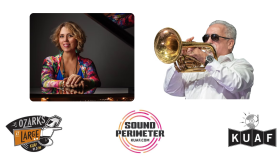Matthew Moore: We begin with elections in Arkansas. And no, we’re not talking the 2026 election. There’s a handful of special elections taking place this coming Tuesday, Nov. 18.
Kristin Netterstrom Higgins is a program associate at the Public Policy Center for the University of Arkansas System Division of Agriculture. She sat down with me in the Bruce and Ann Applegate News Studio 2 earlier this week to talk election season.
She says that Act 300 from 2023 states that special elections must be held on the second Tuesday of May or the second Tuesday of November in odd-numbered years. But due to the Veterans Day holiday, it was pushed back to the 18th.
Kristin Netterstrom Higgins: Before there was a law saying four times a year, and before that it was like any time you wanted to call a special election. So now, in an odd-numbered year, we’re like in May, November, and in an even-numbered year when we have our regular elections, it’ll be in March and November.
Moore: Got it. And so we’re looking at a couple different kinds of special elections across the state. Let’s start specifically with cities who have special elections. I’m looking at your great newsletter here, News and Notes: The Arkansas Ballot Issues, and we’ll have a link to sign up for that. But we’ve got special elections in Bella Vista, Conway, Greenland, Ozark, Sherwood, and Texarkana coming up next week.
Higgins: And those are the ones that we know of because there’s not a central database of special elections at the local level. And so we comb through newspapers. We go through Facebook pages for election commissions. People send us election information. So this is our best attempt at compiling what we know is taking place. And we see a variety of different types of elections happening at the city level.
So we have a referendum in Ozark. The city council there passed an entertainment district ordinance, and there were enough local residents who were concerned and didn’t want that entertainment district. So they went out and collected signatures from voters in the area to put that ordinance on the ballot for the voters to decide whether or not they’ll have an entertainment district.
Greenland, I believe, is an annexation. So you can kind of see the variety of different types of elections, the different types of questions that voters have to decide.
One of the more popular ones, of course, are sales tax elections, bond issues. So a bond issue is when they want to build like a really big project. It could be a water park, it could be a community center, it could be a police station. And the only way to pay for that up front is through a bond issue. And then you would have either a property tax or a sales tax corresponding with that to pay off that debt over time.
Moore: And so the reason to have the election this November in 2025, instead of waiting until 2026 and a normal election cycle, is because you want the money faster, right?
Higgins: Right. So if you’re doing a property tax, then you have to wait an entire year for that tax because we tax a year behind. And so that would be, you know, a year and a half before they would have any income coming in. Same thing with a sales tax. You know, they might say, well, we could wait until next year, but things would just get more expensive. And so if we start it now, there’s usually, depending on when the election is, you know, the sales tax might not start for two months. So, for example, we’re voting in November, it would be January before things would take effect.
Moore: Got it. We’re also looking at a few different school districts across the state with special elections. What differs between, say, a city sales tax and a school district property tax, which is a lot of what we’re looking at here.
Higgins: Right. With the property tax elections, again, that is a school district might want to build. In these instances, there’s a new high school proposed, like an entire campus. There’s a pre-K building being proposed in one community. And so these are large construction projects.
Again, the best way to do that for them and the authority that they have for school districts is the property tax, right. So the school district can’t go out and increase your sales tax, but they can ask you to vote on a millage. That’s what we call it, a millage rate. I always just call it a property tax because that’s a little bit more common.
Moore: Everyday talking.
We don’t talk about millages all the time. So for them, that’s a way to get that money up front, very similar to a home mortgage. So you pay that off over time. And so that money is available as soon as they can sell a bond to pay for the construction up front.
So we see again, just that is the vehicle that school districts have, where cities and counties have sales tax as well as property tax open to them.
Moore: There are also two special elections that are being litigated in the courts right now — a House district in Pulaski County and a Senate district in the Arkansas River Valley. Those are still being litigated at this point. There’s not really anything you and I can really talk about that hasn’t changed or will change by the time this gets on the air.
Higgins: And those elections are supposed to be slated for next year anyway. So because they involve candidates. Where these ones are, again, sales tax, property tax, millage, bond issues.
We have a couple of county elections. I think one is for law enforcement, another one is for the road department. So, I mean, there are all these different issues that county government and local government are dealing with that have nothing to do with candidates.
Moore: Speaking of elections next year, we are going to see some ballot measures on the 2026 ballot here in Arkansas. Some of those will be legislatively referred, right?
Higgins: Right. So right now we only have the legislatively referred amendments. The Arkansas Legislature earlier this year voted to place three proposed constitutional amendments on the 2026 ballot. And then there’s also a bond issue question in addition to those. And so those are definitely on the ballot next November.
Right now we have a couple different citizen groups going around. One is collecting signatures. Two of the groups are involved in a federal lawsuit just over the changes to the citizen initiative process. And depending on the outcome of that lawsuit, or there’s like a temporary restraining order request going on with that one, depending on the outcome of that decision, we might see more groups come forward.
There are a couple that have already had their ballot titles certified by the attorney general, and you might remember that’s the first step. They have to get that ballot title certified by the Attorney General’s Office before they can go collect signatures.
And so we have one group that wants to remove sales tax from period products. Another group that wants to do- they want to pass education policy- that would make any school that receives public funding have to go by the same standards as public schools. And then we have another group that is working on the citizen initiative process and a competing proposal or a complementary proposal. They each do something a little different, but it’s still related to the citizen initiative process.
So we’ve got those out there percolating as well as one that was just proposed by University of Arkansas students, but that proposal hasn’t made it through the Attorney General’s Office yet.
Moore: Right. So let’s do a quick explanation of — it’s not enough to just come up with a proposal and get it onto the ballot. It has to be certified by the attorney general. What does that process look like broadly?
Higgins: You put together a ballot title, and that’s what voters see when they go to vote. It gives them a summary of the constitutional amendment or proposed state law that’s before them. And in addition to that ballot title, you provide the full text — so in this case, a constitutional amendment, you would provide the full "Here’s what this amendment will do. Here’s what it will change or here’s what it will add.”
And that’s not text that you see on the ballot itself. So you give both of those documents to the Attorney General’s Office. And they go over it. They go, “Is this free of misleading language or partisan or coloring language? Is this accurate? Are there spelling errors, grammatical errors?” Because, you know, commas do matter — that can change a policy quickly.
And so they go over and just look to see. And new this year is the eighth-grade reading level for ballot titles. And only if you meet all of those check boxes does your title get certified for circulation. And that’s just, you know, a way to describe that once you get that official certification is when you can go collect the first voter signature.
Moore: And so the one that we were just speaking about were a collection of University of Arkansas students who have drafted what they’re calling the Clean and Healthy Natural Environment Amendment. That one has not been certified by the attorney general at this point, right?
Higgins: Right. So they’ve done it twice now. They’ve attempted twice. The first attempt didn’t meet the eighth-grade reading requirement. And they went and again made some tweaks and brought that back. And the attorney general’s opinion that came out saying, that, it was rejected. It said some of the language in there needed clarifying.
So when you’re talking about governmental entities — which governmental entities? If you’re talking about clean and healthy, well, that might sound a little what they call partisan-tinged or colored language because it sounds like bread and butter. It’s a feel-good type of label. And so what does that actually mean?
Moore: So at this point, none of the citizen-initiated constitutional amendments have gathered enough signatures. How long do they have to gather those?
Higgins: They have until July 2026 to gather more than 100,000 signatures from voters. And I say more than 100,000 — that’s technically more than what they need, but most citizen groups will always collect more than what they need, just in case there’s an issue with a signature or with a page, you know, the paperwork that goes along with it.
Moore: Kristin Netterstrom Higgins is a program associate at the Public Policy Center for the University of Arkansas System Division of Agriculture. You can find a link to the Public Policy newsletter here.
Ozarks at Large transcripts are created on a rush deadline. Copy editors utilize AI tools to review work. KUAF does not publish content created by AI. Please reach out to kuafinfo@uark.edu to report an issue. The audio version is the authoritative record of KUAF programming.








